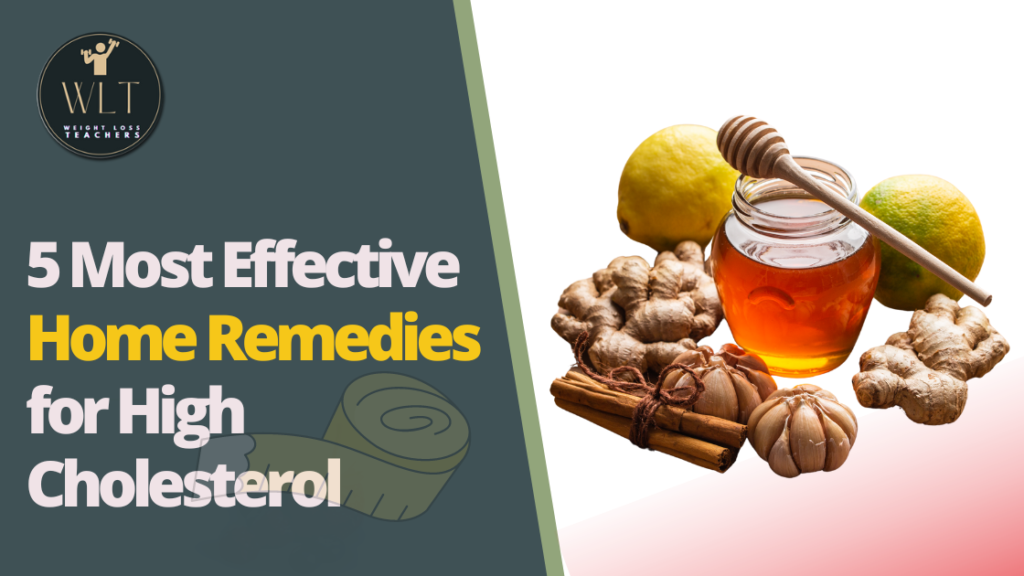
5 Most Effective Home Remedies for High Cholesterol

High cholesterol levels are a significant concern for many individuals worldwide. When left untreated, high cholesterol can lead to various health complications, including heart disease and stroke. While medication is commonly prescribed to manage cholesterol levels, several effective home remedies can also help in reducing cholesterol naturally.
Table of Contents
5 Most Effective Home Remedies for High Cholesterol
In this article, we will explore the top 5 home remedies for high cholesterol and delve into their effectiveness and benefits.
Consume a Heart-Healthy Diet

A balanced and heart-healthy diet plays a crucial role in managing high cholesterol levels. Here are some dietary changes that can make a significant impact:
- Incorporate High-Fiber Foods: Foods rich in soluble fiber, such as oats, barley, legumes, fruits, and vegetables, help reduce LDL cholesterol (the “bad” cholesterol) by binding to it and eliminating it from the body.
- Opt for Healthy Fats: Replace saturated fats (found in red meat, full-fat dairy products, and fried foods) with healthier options, including monounsaturated fats (found in olive oil, avocados, and nuts) and polyunsaturated fats (found in fatty fish, walnuts, and flaxseeds).
- Eat Fish Twice a Week: Fatty fish, like salmon, mackerel, and sardines, are excellent sources of omega-3 fatty acids, which have been shown to reduce triglyceride levels and lower the risk of heart disease.
- Increase Plant Sterols: Plant sterols are naturally occurring substances found in foods like nuts, seeds, and whole grains. They have a structure similar to cholesterol and can help block the absorption of cholesterol in the intestines.
Regular Physical Activity

Engaging in regular physical activity is not only beneficial for weight management but also plays a vital role in managing cholesterol levels. Exercise helps raise HDL cholesterol (the “good” cholesterol) while lowering LDL cholesterol. Here are some effective exercises:
- Aerobic Exercise: Engage in activities such as brisk walking, running, swimming, or cycling for at least 150 minutes per week. These exercises boost heart health, improve circulation, and promote overall well-being.
- Strength Training: Incorporate strength training exercises, like weightlifting or using resistance bands, two to three times a week. Building lean muscle mass can enhance metabolism and aid in maintaining a healthy weight.
- Yoga and Pilates: Practicing yoga and Pilates regularly can improve flexibility, reduce stress levels, and enhance cardiovascular health. Certain yoga poses, such as the bridge pose and the fish pose, specifically target cholesterol management.
Herbal Remedies and Supplements

In addition to lifestyle changes, incorporating certain herbal remedies and supplements can aid in managing high cholesterol levels. However, it is important to note that these remedies should be used under the guidance of a healthcare professional, as they can interact with medications or have side effects for certain individuals. Here are some notable options:
- Garlic: Garlic has been used for centuries for its medicinal properties. It contains compounds like allicin and sulfur, which have been associated with cholesterol-lowering effects. Garlic may help reduce total cholesterol, LDL cholesterol, and triglyceride levels while increasing HDL cholesterol. Consuming raw garlic or taking garlic supplements are potential ways to harness its benefits. However, it is important to consult with a healthcare professional regarding the appropriate dosage and potential interactions with medications.
- Green Tea: Green tea is rich in antioxidants called catechins, which have been linked to numerous health benefits, including lower LDL cholesterol levels. Studies suggest that green tea consumption may help reduce total cholesterol and LDL cholesterol while increasing HDL cholesterol. Regularly enjoying a few cups of green tea daily can contribute to cholesterol management. Green tea extract supplements are also available, but it is advisable to consult a healthcare professional before using them.
- Red Yeast Rice: Red yeast rice is a traditional Chinese remedy made by fermenting rice with a specific type of yeast. It contains naturally occurring statins, such as lovastatin, which inhibit an enzyme involved in cholesterol production in the liver. Red yeast rice has been shown to reduce LDL cholesterol levels effectively. However, it is crucial to consult with a healthcare professional before using red yeast rice supplements, as they may vary in potency and can interact with certain medications.
- Omega-3 Supplements: Omega-3 fatty acids are a type of polyunsaturated fat that is beneficial for heart health. They have been shown to reduce triglyceride levels and may have modest effects on lowering LDL cholesterol. Fatty fish like salmon, mackerel, and sardines are excellent dietary sources of omega-3 fatty acids. However, if it is challenging to incorporate these fish into your diet regularly, omega-3 supplements can be a viable alternative. Fish oil supplements or supplements derived from algae, which is a plant-based source of omega-3s, are available. It is recommended to consult with a healthcare professional regarding the appropriate dosage and potential interactions with medications.
- Psyllium Husk: Psyllium husk is a soluble fiber derived from the seeds of the Plantago ovata plant. It forms a gel-like substance when mixed with water and can help reduce cholesterol levels. The soluble fiber in psyllium binds to bile acids in the gut, leading to increased excretion of cholesterol from the body. This can contribute to lower LDL cholesterol levels. Psyllium husk is available in powder or capsule form and can be added to foods or consumed as a supplement. It is important to follow the recommended dosage and drink plenty of water when using psyllium husk.
- Artichoke Leaf Extract: Artichoke leaf extract is derived from the leaves of the artichoke plant and has been traditionally used for digestive health. It contains compounds such as cynarin and flavonoids that have shown cholesterol-lowering effects. Artichoke leaf extract may help reduce total cholesterol and LDL cholesterol levels while increasing HDL cholesterol. It is available in supplement form and should be taken according to the manufacturer’s instructions or as advised by a healthcare professional.
- Berberine: Berberine is a compound found in several plants, including barberry, goldenseal, and Oregon grape. It has been used in traditional medicine for various health conditions, including high cholesterol. Berberine has been found to have cholesterol-lowering effects by inhibiting an enzyme involved in cholesterol production and improving the clearance of LDL cholesterol from the bloodstream. Several studies have shown that berberine supplementation can lead to significant reductions in total cholesterol, LDL cholesterol, and triglyceride levels while increasing HDL cholesterol. However, it is important to note that berberine can interact with certain medications, so it is crucial to consult with a healthcare professional before using it.
- Hawthorn: Hawthorn is a flowering shrub commonly used in herbal medicine for its cardiovascular benefits. It contains flavonoids and other compounds that may help improve heart health and regulate cholesterol levels. Hawthorn has been shown to have antioxidant and anti-inflammatory properties, which can contribute to reducing LDL cholesterol levels and promoting overall cardiovascular health. Hawthorn supplements are available in various forms, including capsules, extracts, and teas. Consult with a healthcare professional for appropriate dosage and usage guidelines.
- Turmeric: Turmeric is a spice commonly used in cooking and is known for its vibrant yellow color and distinct flavor. It contains a compound called curcumin, which has been extensively studied for its potential health benefits. Curcumin has shown anti-inflammatory and antioxidant properties, which may contribute to lowering cholesterol levels. Several studies have suggested that curcumin supplementation can reduce total cholesterol, LDL cholesterol, and triglyceride levels while increasing HDL cholesterol. Adding turmeric to dishes or taking curcumin supplements can be beneficial. However, it is important to note that curcumin has low bioavailability, and combining it with black pepper or fat can enhance its absorption.
- Policosanol: Policosanol is a mixture of plant waxes derived from sources such as sugarcane, wheat germ, and beeswax. It has been studied for its potential cholesterol-lowering effects. Policosanol has shown to reduce LDL cholesterol levels and increase HDL cholesterol. It is believed to inhibit cholesterol synthesis in the liver and enhance the breakdown of LDL cholesterol. Policosanol supplements are available in various strengths and should be taken as recommended by a healthcare professional.
It is crucial to remember that while herbal remedies and supplements can be beneficial in managing high cholesterol, they are not meant to replace prescribed medications or essential lifestyle changes. It is essential to consult with a healthcare professional or a qualified herbalist before incorporating any herbal remedies or supplements into your routine. They can provide guidance on appropriate dosages, potential interactions with medications, and monitor your progress to ensure optimal cholesterol management.
Weight Management

Maintaining a healthy weight is crucial for managing cholesterol levels effectively. Excess weight, especially around the waist, can contribute to higher cholesterol levels. Implement the following strategies to achieve and maintain a healthy weight:
- Balanced Caloric Intake: Consume a balanced diet that provides adequate nutrients without excess calories. Focus on portion control and avoid overeating.
- Mindful Eating: Practice mindful eating by paying attention to hunger and fullness cues. Slow down while eating, savor each bite, and avoid distractions like TV or smartphones.
- Regular Meal Patterns: Establish regular meal patterns and avoid skipping meals. Eating at consistent times can help regulate metabolism and prevent overeating.
- Healthy Snacking: Opt for healthy snacks such as fruits, vegetables, nuts, or low-fat yogurt instead of sugary or processed snacks. These choices can help control cravings and promote weight management.
Lifestyle Modifications

Apart from dietary changes and exercise, certain lifestyle modifications can significantly contribute to managing high cholesterol levels. Consider the following:
- Quit Smoking: Smoking damages blood vessels, lowers HDL cholesterol, and increases the risk of heart disease. Quitting smoking can improve cholesterol levels and overall cardiovascular health.
- Limit Alcohol Consumption: Excessive alcohol intake can lead to higher cholesterol levels and contribute to weight gain. Moderate alcohol consumption, if any, is recommended. It is advised to consult with a healthcare professional regarding alcohol consumption and its impact on cholesterol.
- Manage Stress: Chronic stress can elevate cholesterol levels and increase the risk of heart disease. Engage in stress-reducing activities such as meditation, deep breathing exercises, or hobbies to manage stress effectively.
- Get Sufficient Sleep: Poor sleep patterns and inadequate sleep have been associated with higher cholesterol levels. Aim for 7-9 hours of quality sleep each night to support overall health and cholesterol management.
Conclusion
High cholesterol levels can pose a significant risk to your cardiovascular health. By incorporating these five effective home remedies into your lifestyle, you can naturally manage and reduce cholesterol levels. Remember to consult a healthcare professional before making any significant changes to your diet or incorporating herbal remedies or supplements. By adopting these remedies alongside regular monitoring and medical guidance, you can take control of your cholesterol levels and promote a healthy heart.
Disclaimer: The information provided in this article is for educational purposes only and should not be considered as a substitute for medical advice. Consult a healthcare professional before implementing any home remedies or making significant changes to your lifestyle.






